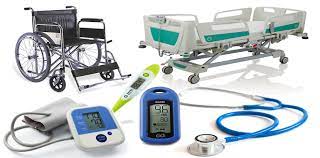
Are you interested in starting a medical equipment supply business in Nigeria? With a huge population of over two hundred million (200,000,000) people, Nigeria presents a great market opportunity for any aspiring entrepreneur. This ultimate guide will provide you with all the essential information and resources you need to get started on your journey to success.
Here, you'll learn how to source medical supplies, obtain licenses, build relationships with vendors, and much more. By the end of this guide, you’ll have all the knowledge you need to start a profitable medical equipment supply business in Nigeria.
Understanding the Medical Equipment Supply Industry in Nigeria
Before starting a medical equipment supply business in Nigeria, it is essential to have a thorough understanding of the industry. The healthcare sector in Nigeria has been experiencing rapid growth, creating a significant demand for medical equipment and supplies.
The country's population, coupled with an increasing focus on improving healthcare services, presents a lucrative opportunity for entrepreneurs in this field.
One must consider the unique challenges and dynamics of the Nigerian market when entering the medical equipment supply industry. These include limited access to quality healthcare facilities in certain regions, budget constraints of healthcare institutions, and the need to navigate complex regulatory processes.
Additionally, it is important to research and understand the specific requirements and preferences of healthcare professionals and facilities in Nigeria. This will help you identify the most in-demand medical equipment and tailor your product offerings accordingly.
Having a solid grasp of the industry's current trends, challenges, and opportunities will enable you to make informed decisions and develop a competitive edge. By staying up-to-date with industry news and networking with healthcare professionals and industry experts, you can gain valuable insights into the medical equipment supply landscape in Nigeria and position your business for success.
Conducting Market Research and Identifying Your Niche
Before starting a medical equipment supply business in Nigeria, it is crucial to conduct thorough market research and identify your niche. This step is essential for understanding the demand for specific medical equipment and identifying potential competitors.
Start by researching the healthcare industry in Nigeria, including the number of hospitals, clinics, and healthcare facilities in different regions. This will give you an idea of the potential customer base for your business. Additionally, consider the current healthcare challenges and trends in the country to identify potential gaps in the market that you can fill.
Next, narrow down your focus by identifying a niche within the medical equipment supply industry. This could be specializing in a particular type of equipment, such as surgical instruments or diagnostic machines, or catering to a specific sector, such as private clinics or government hospitals. By specializing, you can differentiate yourself from competitors and target a specific audience.
Furthermore, it is crucial to assess the competition in your chosen niche. Research existing suppliers and distributors in Nigeria and determine their product offerings, pricing strategies, and market presence. This will help you understand your competitors' strengths and weaknesses and identify areas where you can differentiate your business.
Conducting thorough market research and identifying your niche will provide you with valuable insights to develop a successful business strategy and position yourself effectively in the medical equipment supply industry in Nigeria.
Developing a Business Plan for Your Medical Equipment Supply Business
Before you start your medical equipment supply business in Nigeria, you need to have a comprehensive business plan. A business plan is like a roadmap that guides your business operations, and it's crucial to have one if you want to succeed in this industry.
Your business plan should include the following components: executive summary, company description, market analysis, products and services, sales and marketing, management and operations, financial projections, and funding requirements.
The executive summary should give an overview of your business and what you intend to achieve. The company description should explain your mission statement, vision, and objectives.
The market analysis should identify your target market, competition, and potential customers. The products and services section should outline the type of medical equipment you'll supply, how you'll source them, and how they'll meet your customers' needs.
The sales and marketing section should describe your pricing strategy, sales tactics, and advertising plan. The management and operations section should outline your management structure, employees, and day-to-day operations. The financial projections should include a balance sheet, income statement, and cash flow statement.
Lastly, you'll need to outline your funding requirements. Will you self-finance, get investors, or get a loan? Once you have a business plan in place, you'll have a better idea of how to start your medical equipment supply business.
Registering Your Business and Obtaining Necessary Licenses
Once you have developed your business plan and identified your niche in the medical equipment supply industry, the next step is to register your business and obtain the necessary licenses in Nigeria. This process is essential for establishing your business as a legal entity and ensuring compliance with local regulations.
To register your business, you will need to choose a business name and register it with the Corporate Affairs Commission (CAC) in Nigeria. You will also need to obtain a Tax Identification Number (TIN) from the Federal Inland Revenue Service (FIRS) and register for Value Added Tax (VAT) with the Federal Inland Revenue Service.
In addition to registering your business, you will need to obtain necessary licenses and permits specific to the medical equipment supply industry. This may include obtaining a License to Operate as a Medical Equipment Supplier from the National Agency for Food and Drug Administration and Control (NAFDAC). It is important to research and understand the specific licensing requirements for your business and comply with all regulations to ensure smooth operations and avoid legal issues.
Registering your business and obtaining necessary licenses may require some time and effort, but it is a crucial step in establishing a legitimate and trustworthy medical equipment supply business in Nigeria.
Sourcing Your Products from Reliable Suppliers
In order to ensure that your medical equipment supply business is successful, you need to make sure that you are sourcing your products from reliable suppliers. There are a few ways to do this.
First, you can attend trade shows and exhibitions that focus on medical equipment and connect with suppliers there. This will allow you to meet with suppliers face-to-face and get a sense of the quality of their products. Another option is to do research online and look for reviews and ratings of suppliers. You can also reach out to healthcare facilities and professionals and ask for recommendations.
Once you have identified potential suppliers, it's important to establish clear communication and build a relationship with them. You should also ask for samples of their products and conduct quality control checks to ensure that they meet your standards.
By sourcing your products from reliable suppliers, you can ensure that your business provides high-quality medical equipment that meets the needs of healthcare facilities and professionals in Nigeria.
Setting up an Effective Marketing Strategy
Marketing is an essential component of any business, and it is crucial to have an effective marketing strategy in place when starting a medical equipment supply business. Your marketing strategy should aim to reach potential customers and build brand awareness while showcasing the value and quality of your products.
One effective approach is to identify key healthcare facilities and professionals in your target market and develop personalized marketing messages that cater to their needs. Attend trade shows, conferences, and networking events to connect with potential customers and establish relationships. Utilize social media platforms such as LinkedIn and Twitter to share industry news, engage with customers and showcase your products.
Another strategy is to invest in advertising in relevant medical publications and industry websites. Consider leveraging search engine optimization techniques to ensure your business ranks high on Google search results pages.
Leverage referral programs and word-of-mouth advertising to gain new customers and retain existing ones. Ultimately, your marketing strategy should aim to differentiate your business from competitors while building long-term relationships with your target market.
Creating an Online Presence for Your Business
In today's digital age, having a strong online presence is crucial for any business to succeed. The same goes for your medical equipment supply business. By establishing an online presence, you can reach a wider audience and increase your visibility in the market. Here are a few ways to create an effective online presence for your business:
1. Create a website: Your website is the face of your business in the digital world. Make sure it is well-designed, user-friendly, and provides all the necessary information about your business, products, and services.
2. Social media: Social media platforms like Facebook, Instagram, and LinkedIn can be great tools for promoting your business and engaging with your audience. Make sure to post regularly and respond to any queries or comments from your followers.
3. Online listings: Register your business on online directories like Google My Business, Yellow Pages, and local business directories. This will improve your visibility on search engines and help potential customers find your business easily.
4. Online advertising: Consider investing in online advertising to reach a wider audience. You can use Google Ads, social media ads, or other online advertising platforms to target specific audiences based on demographics, interests, and behavior.
By creating a strong online presence, you can attract new customers, build brand awareness, and grow your business in the competitive medical equipment supply industry in Nigeria.
Establishing Relationships with Healthcare Facilities and Professionals
One of the most important aspects of running a successful medical equipment supply business is building strong relationships with healthcare facilities and professionals. These connections can help you establish trust, gain referrals, and generate new business.
To start, make a list of healthcare facilities and professionals in your target market, and research their needs and preferences. Then, reach out to them and offer to provide a customized solution for their equipment needs. Attend relevant industry events and conferences, and network with potential clients in person.
It's also important to maintain communication and follow-up regularly to stay top of mind and offer ongoing support. This can include providing technical assistance, training, and equipment maintenance services. Additionally, offering incentives such as discounts, referral bonuses, and exclusive deals can help strengthen these relationships even further.
By prioritizing your customers' needs and investing in building long-term relationships, you can ensure a steady flow of business and establish a strong reputation in the industry.
Providing Exceptional Customer Service to Build Loyalty and Repeat Business
In the competitive world of medical equipment supply, providing exceptional customer service is crucial for building loyalty and securing repeat business. As a supplier, your clients are often healthcare facilities and professionals who rely on your products to provide quality care to their patients. Here are some strategies to ensure exceptional customer service:
1. Prompt and reliable communication: Respond to inquiries and orders promptly and accurately. Maintain open lines of communication and keep clients informed about product availability, delivery timelines, and any changes or updates.
2. Product knowledge and expertise: Invest in training your team to have a deep understanding of your products. This will enable them to answer client questions, provide recommendations, and troubleshoot any issues that may arise.
3. Tailored solutions: Understand the unique needs of each client and offer personalized solutions. This can involve customizing orders, offering bulk discounts, or providing after-sales support.
4. Timely and reliable delivery: Deliver orders on time and in good condition. Keep clients updated on the status of their shipments and resolve any delivery issues promptly.
5. Proactive problem-solving: Anticipate and address client concerns before they become major issues. This can involve regular check-ins, quality control measures, and proactive problem-solving approaches.
6. Continuous improvement: Seek feedback from clients and use it to improve your services. Regularly assess your customer service processes and implement changes to enhance the client experience.
By consistently providing exceptional customer service, you will build trust and loyalty among your clients. This will not only result in repeat business but also lead to referrals and positive word-of-mouth, ultimately helping your medical equipment supply business thrive in Nigeria.
Ensuring Quality Control and Managing Inventory for Smooth Operations
One of the keys to success in the medical equipment supply business is ensuring that the products you offer are of high quality. To achieve this, you need to establish quality control measures that will help you identify and address any issues that may arise. This includes conducting regular inspections of your products, checking for any defects, and ensuring that all equipment meets the necessary regulatory requirements.
Another important aspect of managing a successful medical equipment supply business is managing your inventory effectively. You need to have a good understanding of the products you offer and how much stock you need to keep on hand at any given time.
This will help you avoid running out of stock, which could lead to lost sales and dissatisfied customers. You also need to keep track of your inventory levels to ensure that you are not holding onto too much stock that could become outdated or obsolete.
Overall, ensuring quality control and managing inventory are crucial to the success of your medical equipment supply business. By implementing effective strategies for both, you can ensure that your business runs smoothly and that you can continue to provide high-quality products to your customers.






















